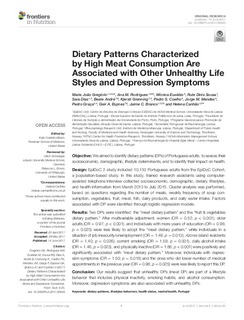Dietary Patterns Characterized by High Meat Consumption Are Associated with Other Unhealthy Life Styles and Depression Symptoms
Gregorio, Maria Joao; Rodrigues, Ana; Eusébio, Mónica; Sousa, Rute; Dias, Sara; Andre, Beate; Grønning, Kjersti; Coelho, Pedro S.; Mendes, Jorge M.; Graça, Pedro; Espnes, Geir Arild; Branco, Jaime C.; Canhão, Helena
Journal article, Peer reviewed
Published version
Permanent lenke
http://hdl.handle.net/11250/2458888Utgivelsesdato
2017Metadata
Vis full innførselSamlinger
Originalversjon
https://doi.org/10.3389/fnut.2017.00025Sammendrag
Objective: We aimed to identify dietary patterns (DPs) of Portuguese adults, to assess their socioeconomic, demographic, lifestyle determinants, and to identify their impact on health.
Design: EpiDoC 2 study included 10,153 Portuguese adults from the EpiDoC Cohort, a population-based study. In this study, trained research assistants using computer-assisted telephone interview collected socioeconomic, demographic, dietary, lifestyles, and health information from March 2013 to July 2015. Cluster analysis was performed, based on questions regarding the number of meals, weekly frequency of soup consumption, vegetables, fruit, meat, fish, dairy products, and daily water intake. Factors associated with DP were identified through logistic regression models.
Results: Two DPs were identified: the “meat dietary pattern” and the “fruit & vegetables dietary pattern.” After multivariable adjustment, women (OR = 0.52; p < 0.001), older adults (OR = 0.97; p < 0.001), and individuals with more years of education (OR = 0.96; p = 0.025) were less likely to adopt the “meat dietary pattern,” while individuals in a situation of job insecurity/unemployment (OR = 1.49; p = 0.013), Azores island residents (OR = 1.40; p = 0.026), current smoking (OR = 1.58; p = 0.001), daily alcohol intake (OR = 1.46; p = 0.023), and physically inactive (OR = 1.86; p < 0.001) were positively and significantly associated with “meat dietary pattern.” Moreover, individuals with depression symptoms (OR = 1.50; p = 0.018) and the ones who did lower number of medical appointments in the previous year (OR = 0.98; p = 0.025) were less likely to report this DP.
Conclusion: Our results suggest that unhealthy DPs (meat DP) are part of a lifestyle behavior that includes physical inactivity, smoking habits, and alcohol consumption. Moreover, depression symptoms are also associated with unhealthy DPs.

